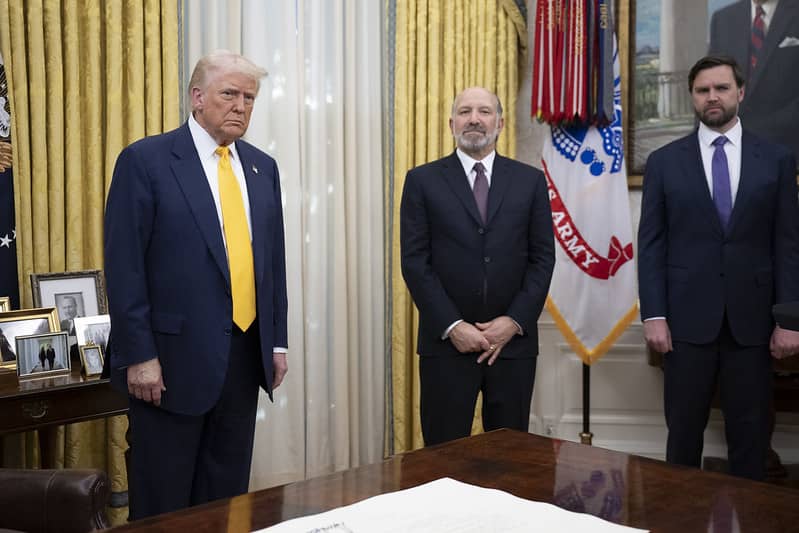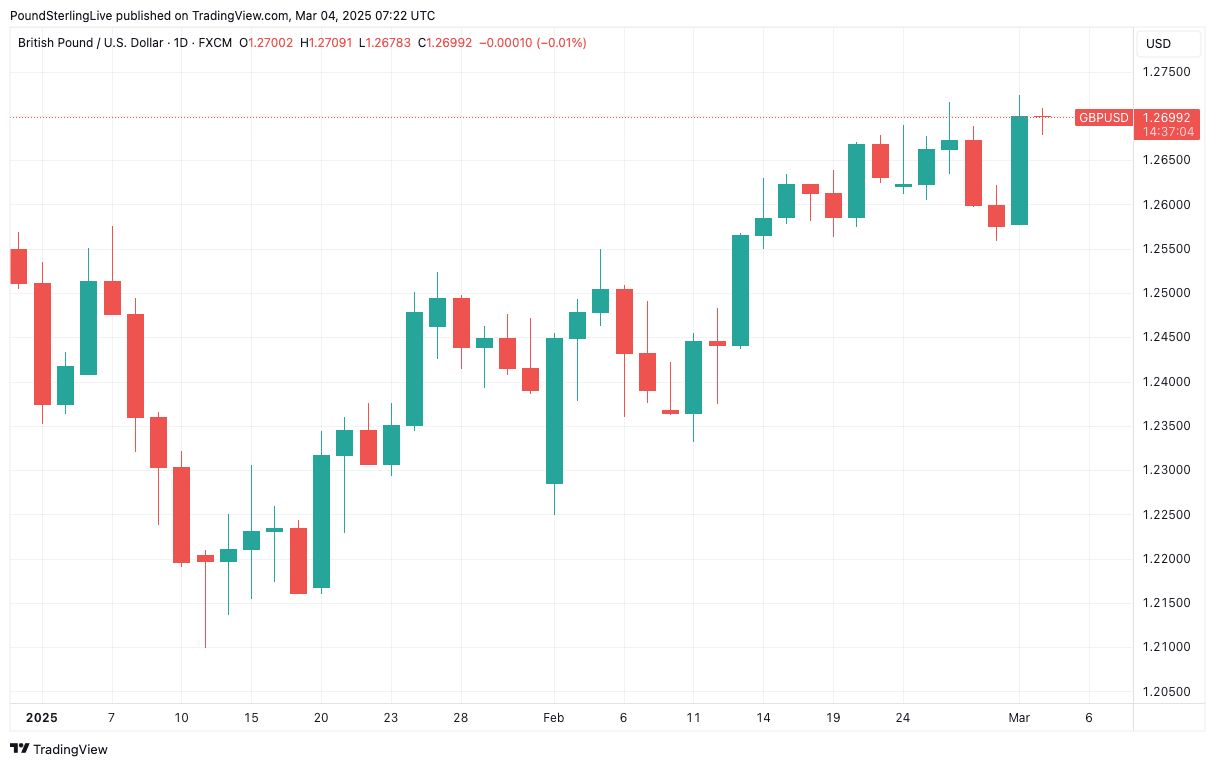
Above: Trump and Commerce Secretary Howard Lutnick in the White House.
Tariffs and DOGE are hitting confidence and raising bets that the Federal Reserve will need to cut more.
The U.S. Dollar fell by nearly a per cent on the day U.S. President Donald Trump said tariffs on Mexico and Canada would proceed, confirming that markets see the move as a negative development for the U.S. economy.
The Pound-to-Dollar exchange rate rose to 1.2723 on Tuesday, a new two-and-a-half month peak, after Trump on Monday said there's "no room left for Mexico or for Canada. No. The tariffs you know, they're all set. They go into effect tomorrow."
The Dollar registered a similar loss against the Euro and Yen.
Canada responded with reciprocal tariffs, as did China, after Trump said an additional 10% would be added to February's 10% tariff on Chinese imports.
The dollar index - a measure of broad U.S. Dollar value - fell 0.80% on the day the tariffs were announced, making for the largest decline in four weeks.
Until now, the Dollar had tended to rise into tariff escalation, hinting of a flip in reaction function that points to further weakness as Trump pursues further tariffs.
"This changing reaction of the dollar comes amid an apparent broader shift in market perspectives on tariffs over the past few weeks, with the focus moving from the potential boost to inflation to the negative implications for growth," says Jim Reid, Strategist at Deutsche Bank.
"A shake-up the new government wanted is underway, and there is early evidence emerging that confidence is wobbling, from tariff uncertainty in particular," he adds.
A slowdown in U.S. economic data is becoming clear, which is leading financial markets to bet on further interest rate cuts at the Federal Reserve. Money markets show investors are pricing in 75 basis points of cuts by the December meeting.
This implies three 25bp cuts, which is up from the solitary cut expected at the start of February. This is weighing on U.S. bond yields, which in turn mechanically weighs on the Dollar.
"The latest U.S. economic data continues to suggest that Trump policies are making a notable impact on activity," says Sam Hill, Head of Market Insights at Lloyds Bank.
Above: GBPUSD at daily intervals.
The Atlanta Federal Reserve's real-time measure of GDP growth is now forecasting U.S. GDP growth for the first quarter has dropped to -2.8% from -1.5%.
"It's ridiculous for anyone to claim that foreign nations have more to lose from a trade war than the U.S. Tariffs are taxes on imports. The U.S. is more dependent on imports than any other nation. Therefore, the U.S. has more to lose from a trade war than any other nation!" says Peter Schiff, Chief Economist and Global Strategist at Euro Pacific.
Monday's Services PMI for February reported that DOGE spending cuts were having ripple effects on private sector spending decisions.
The Manufacturing ISM report yesterday pointed to the role of uncertainty over tariffs.
The headline index of 50.3 for February was only 0.6 points down from January, but Hill says the developments in the components "were much wilder".
For instance, the price index rose 7.5 points to 62.4, while the new orders component dropped 6.5 points to 48.6.
"Prices rising sharply, activity signals slipping into contraction territory. Taking account of the employment component dipping below 50 too, it is remarkable that the headline index, an equal-weighted composite of five sub-components, held in above 50," Hill explains.
Torsten Sløk, Chief Economist at Apollo Global Management, cautions that "the near-term downside risks to the economy and markets are growing... we are starting to worry about the downside risks."
He explains that elevated policy uncertainty centred on the DOGE programme will begin to have a negative impact on capex spending and hiring decisions.
"Torsten Slok, who has been adamant and correct on the U.S. economy for a long time (bullish) is turning more cautious and I think that’s worth paying attention to," says Brent Donnelly, founder of Spectra Markets.

